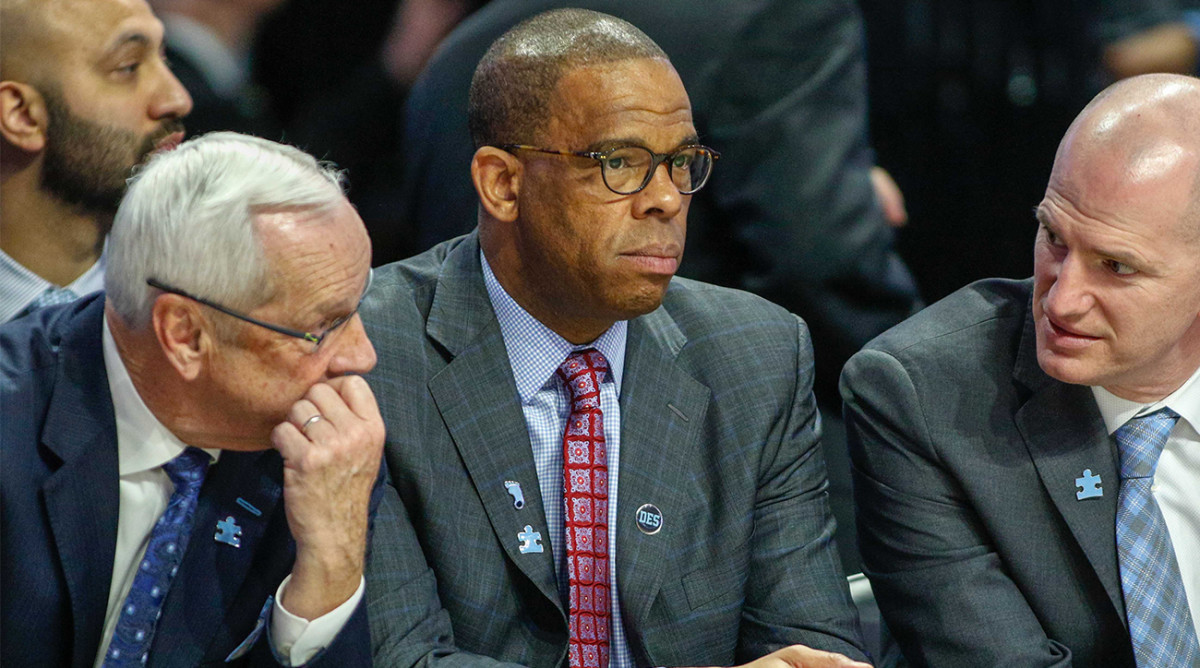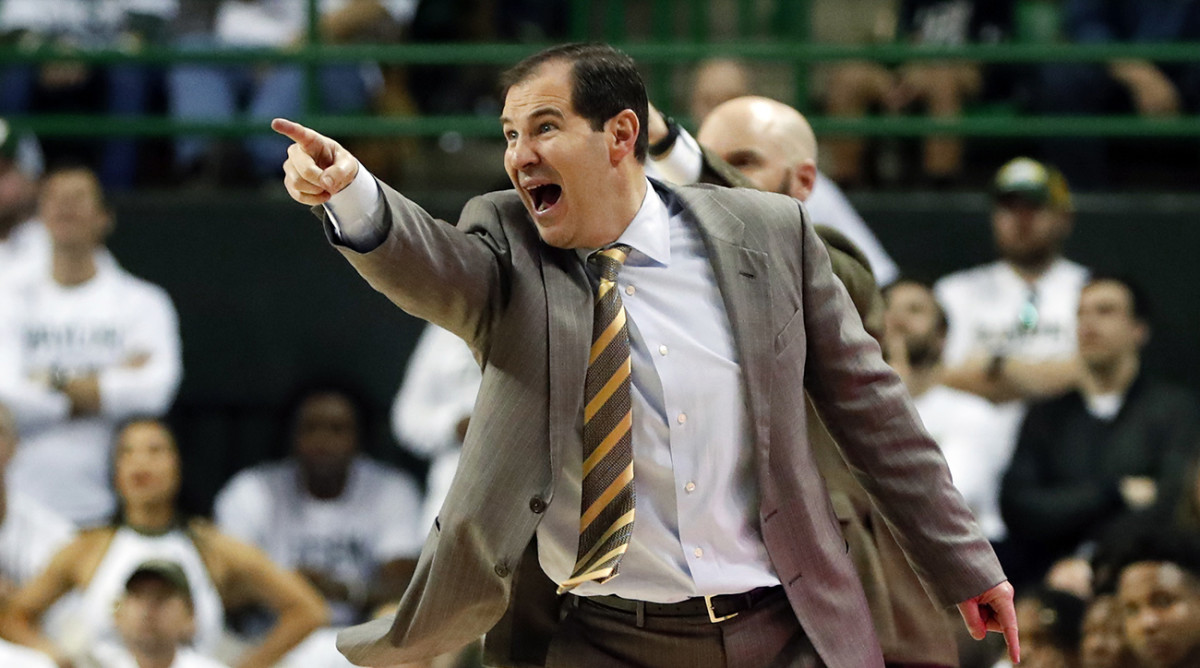Who Will Succeed Roy Williams at North Carolina?
Roy Williams was spinning yarns in the North Carolina men’s basketball locker room before a practice in late October 2019, and I was down to my final minutes with him before I had to go. So I fired the successor question: Does the coach who comes after you need to come from the Carolina family tree?
“I would like for it to be a Carolina guy,” Williams told me. “I don’t know if I have any say in it. But I want it to be someone with the same beliefs for what North Carolina has always stood for. For whoever it is, I’d like to see them continue that part of it.”
That will be the framework for one of the most fascinating coaching searches in a long time. With Williams announcing his retirement Thursday at age 70, after winning three national championships and succeeding brilliantly in continuing the legacy of his mentor, Dean Smith, does North Carolina keep it in the family yet again?
If so, the list of likely replacements is short. If they broaden the search, it gets really interesting for athletic director Bubba Cunningham. (Cunningham has been in the men’s NCAA tournament bubble in Indianapolis as part of the men’s basketball committee.) This is the Cadillac job of Cadillac jobs.
For years, I’ve had a running conversation with one industry insider about what the job landscape looks like and the discussion always starts with the same premise from him: If North Carolina opens, it’s the lead domino regardless of what happens anywhere else. So let’s take a look at a two-tier Roy Williams successor list.
FORDE: Roy Williams Is Far More Than Just a Basketball Coach

The first tier, keeping it in the family:
Hubert Davis, current UNC assistant coach. Davis is the most connected of anyone, having played under Smith and worked under Williams. This is the only college basketball program he’s ever known. Davis has been on the Tar Heels bench for nine seasons, having migrated there from an analyst job at ESPN, and before that having played 12 years in the NBA. If the current trend of hiring an alum with some NBA caché is appealing to Cunningham and the rest of UNC’s leadership, Davis is a compelling choice. It also stands to reason that Williams would champion a diversity hire as his replacement.
Steve Robinson, current UNC assistant coach. He’s Williams’s longest-tenured assistant, having been at his side since the beginning in Chapel Hill in 2003. Before that, Robinson worked with Williams at Kansas twice, from 1988–95 and again for the 2002–03 season before they moved to Carolina. Between those stints, Robinson was the head coach at Florida State—and it didn’t go well. He had a winning record in his first season and a losing one in each of the next four, which led to his firing in 2002. For that reason, promoting him up the ladder to replace Williams would seem like a tough sell. But he’s been integral to the program’s success as a member of three national championship staffs, and he also would fulfill the diversity component.
Wes Miller, head coach at UNC Greensboro. Miller played at North Carolina as a walk-on guard from 2004–07, when the Heels won their first national title under Williams. He got the job at Greensboro in 2011 at the tender age of 28, and has turned the program into a mid-major power. The school stuck with him through five losing seasons to start his tenure, and the reward has been five straight 20-win seasons and two NCAA tournament berths. His record the past five seasons: 125–42. He’s resisted going after other jobs as his star has risen, fueling some speculation he’s had his eye on succeeding Williams. The drawback would be translating his success from the Southern Conference to the Atlantic Coast Conference, though Miller certainly knows the Carolina program inside out.
A potential second tier, if Carolina expands its pool of candidates:
Jay Wright, Villanova. He handed Williams one of the most painful defeats of his career in the 2016 NCAA championship, but he’s obviously abundantly capable of winning at the highest level at North Carolina or anywhere. Wright is in a perfect situation as is at Villanova, so it would be a surprise if he uproots for another college job. But after 20 seasons at ’Nova and at age 59, does he have the itch to try something new that doesn’t involve moving to the NBA?
Mark Few, Gonzaga. Similar to Wright, although probably even less likely to take himself out of what he’s built. Few is a Pacific Northwest lifer who loves the lifestyle there, and he has everything in place to win forever at Gonzaga. Hard to see it happening, but he’s close with Williams (to whom Few lost the 2017 championship game) and if he ever wants to try life as a top dog instead of a perpetual underdog, here’s the chance.
Billy Donovan, Chicago Bulls. For the last couple of years, the speculation was that this is the one job that could bring Donovan back to the college game. But the timing is bad, with Donovan just a year into his tenure with the Bulls, and he’s not a job-hopping kind of guy. Also, there was old recruiting friction with Williams dating back to early in Donovan’s time at Florida. That may be water well under the bridge by now, but maybe not.
Brad Stevens, Boston Celtics. Put Stevens in the same category as Donovan. But he seems even less likely to want to return to college, and the Hoosier State native already turned down overtures from Indiana in March. A real long shot but worth a phone call.

Scott Drew, Baylor. He’s 50–6 the past two seasons and still in the mix for the 2021 national championship at a school that historically has no business winning a national championship. Drew had more natural ties to Indiana than to this job—but this is a better job. If he wants to coach at a basketball school instead of in the heart of football country, this would be the opportunity. Drew angered some of his coaching colleagues early in his career on the recruiting trail, to the point where he might be a tough sell at a place like Carolina.
Eric Musselman, Arkansas. He’s been a college head coach for six years and produced six 20-win seasons. He took Nevada to the Sweet 16 in 2018 and Arkansas to the Elite Eight this March. His style of play is entertaining and he seemingly has mastered the very necessary modern art of melding transfers into a program. He’s quickly become beloved at Arkansas—but that is a good job, and Carolina is a great job.
Rick Barnes, Tennessee. A native of Hickory, N.C., you’d have to think this one would be Barnes’s ideal swan-song job. He’s won more than 700 college games and revived Texas and Tennessee. But at age 66 and owning an undistinguished NCAA tournament record, he’d be swimming upstream to get this one.
Chris Holtmann, Ohio State. He’s had eight straight 20-win seasons at three places, Gardner-Webb (in Boiling Springs, N.C.), Butler and Ohio State. At age 49 he’s established but still has a long career runway ahead of him. The late-season fade of his most recent Buckeyes team leaves a mark, most notably losing as a No. 2 seed in the NCAA tourney to No. 15 Oral Roberts.
Porter Moser, Loyola Chicago. Moser has taken a mid-major program to the Final Four and Sweet 16 in the past three NCAA tournaments, and his team’s beatdown of No. 1 seed Illinois in the round of 32 this year is one of the most impressive victories of the season. Moser is an adept team-builder and culture creator, but his roots are straight Midwest and his style of play is pretty much the antithesis of Williams’s style. This would be a step into the unfamiliar for both parties.
